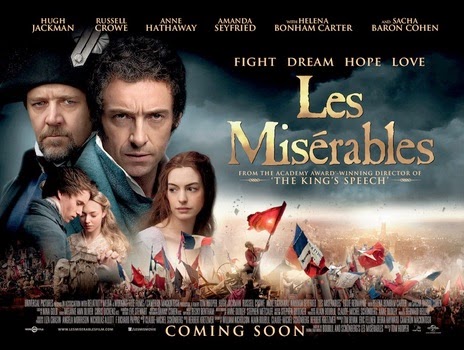Friends of mine may know that I’ve had the honour of
winning an online competition to get the opportunity to interview Hugh Jackman
face-to-face live in Singapore, when he came down in May to promote X-Men Days
of Future Past. He was a very friendly star with no airs, and it was after the
interview, that I felt curious enough to look for his other works, such as the
Prestige.
During my retreat in CISC over the past week, while I
was mulling over the concept of “mercy” in the Beatitudes, when I was suddenly
reminded of two very different characters played by Mr Jackman, in two films
which could not have stated the contrast better, what it means to accept mercy
and what it means to deny mercy.
In The Prestige, Hugh Jackman’s Robert Angier is so
consumed with Christian Bale’s Alfred Borden at having caused his girlfriend’s drowning
accident, he practically devotes his entire life towards getting back at him.
In the movie poster, the tag line states, “are you watching closely?” Sad to
say, for their characters in the film, are so concentrated on watching as each
other as adversaries closely, they completely lose sight of themselves. In the
process of this relentless duel, they sacrifice their physical health, career,
friends, loved ones, and eventually themselves. What was initially a healthy
devotion to professionalism for their vocation of performing magic, veers off
course till they’re so possessed by the notion that the other party has trumped
them, they fail to treasure what they have till all was lost. By refusing to
show mercy to each other, they were actually denying themselves of mercy. A
conversation in the movie sums things up quite nicely.
Nikola Tesla: Mr. Angier, have you considered the cost
of such a machine?
Robert Angier: Price is not an object.
Nikola Tesla: Perhaps not, but have you considered the
‘cost’?
Robert Angier: I'm not sure I follow.
Nikola Tesla: Go home. Forget this thing. I can
recognize an obsession, no good will come of it.
Robert Angier: Why, haven't good come of your
obsessions?
Nikola Tesla: Well, at first. But I followed them too
long. I'm their slave... and one day they'll choose to destroy me.
Robert Angier: If you understand an obsession, then you
know you won't change my mind.
Les
Miserables is a well-known epic by Victor Hugo, which has been adapted into
films and even a staple Broadway musical. Hugh Jackman plays the role of
protagonist Jean Valjean in the most recent film adaptation in 2012. A friend
always jokes that the story is essentially about the rest of the life an
ex-convict who had stolen a loaf of bread. Well, I’d like to add she missed out
the critical “redemption through mercy” part in the equation, which without it,
would quite frankly render the entire story meaningless.
Having
been inspired by a kind bishop, after his release from prison, Jean Valjean turns
his life around as mayor of a small town. However, his old enemy, the fanatic police
inspector Javert is convinced that a leopard never changes his spots, and he
makes it his personal mission to “stalk” Valjean. In the midst of this, Jean
Valjean adopts Cosette, daughter of Fantine (an ill-treated factory worker of
his), as he feels responsible over her descent into prostitution. As he tries
his best to protect and provide for Cosette throughout the rest of his life,
all members are swept into the political turmoil in 1830s France.
At
the finale of the film, Jean Valjean passes away content and peaceful, knowing
he has done it utmost to uphold his promise to the bishop and Fantine. However,
things are much bleaker for Javert, who unable to reconcile his devotion to the
law with his realisation that sometimes lawful course is immoral, takes his own
life.
The movie poster has the caption “Fight Dream Hope Love”, each
representing the life mottos of the characters of Javert, Fantine, Valjean and
Cosette respectively. Fantine’s courage in asking Valjean for mercy in taking
care of her daughter, as well as Valjean’s willingness to grant mercy, accounts
for the peace granted to Valjean and Fantine as the end of their days.
Meanwhile, Javert’s obsessive stubbornness at denying others that much needed
mercy, is precisely the factor which drives him to suicide as he is unable to
forgive himself when he discerns the error of his past beliefs.
I’ll conclude this entry with a snapshot of the
process towards and away from God, which I had gotten from the retreat. Both
journeys start from the same point and their various “symptoms” at each stage
may mirror and contrast their corresponding stage in the alternative journey.
Blessed are the merciful, for they will be shown mercy.
Matthew 5:7 (NIV)



